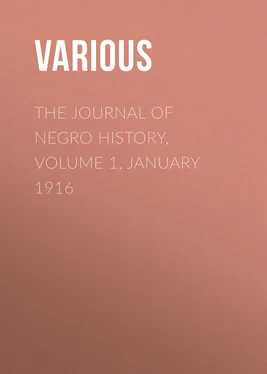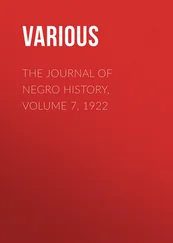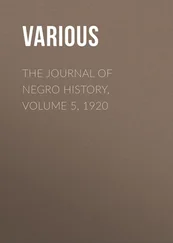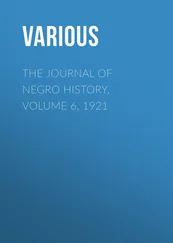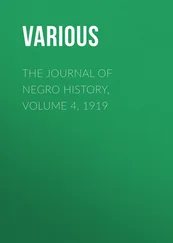Various - The Journal of Negro History, Volume 1, January 1916
Здесь есть возможность читать онлайн «Various - The Journal of Negro History, Volume 1, January 1916» — ознакомительный отрывок электронной книги совершенно бесплатно, а после прочтения отрывка купить полную версию. В некоторых случаях можно слушать аудио, скачать через торрент в формате fb2 и присутствует краткое содержание. Жанр: foreign_antique, periodic, История, foreign_edu, на английском языке. Описание произведения, (предисловие) а так же отзывы посетителей доступны на портале библиотеки ЛибКат.
- Название:The Journal of Negro History, Volume 1, January 1916
- Автор:
- Жанр:
- Год:неизвестен
- ISBN:нет данных
- Рейтинг книги:5 / 5. Голосов: 1
-
Избранное:Добавить в избранное
- Отзывы:
-
Ваша оценка:
- 100
- 1
- 2
- 3
- 4
- 5
The Journal of Negro History, Volume 1, January 1916: краткое содержание, описание и аннотация
Предлагаем к чтению аннотацию, описание, краткое содержание или предисловие (зависит от того, что написал сам автор книги «The Journal of Negro History, Volume 1, January 1916»). Если вы не нашли необходимую информацию о книге — напишите в комментариях, мы постараемся отыскать её.
The Journal of Negro History, Volume 1, January 1916 — читать онлайн ознакомительный отрывок
Ниже представлен текст книги, разбитый по страницам. Система сохранения места последней прочитанной страницы, позволяет с удобством читать онлайн бесплатно книгу «The Journal of Negro History, Volume 1, January 1916», без необходимости каждый раз заново искать на чём Вы остановились. Поставьте закладку, и сможете в любой момент перейти на страницу, на которой закончили чтение.
Интервал:
Закладка:
Before so harsh a decision was pronounced upon our nature, we might have expected–if sad experience had not taught us, to expect nothing but injustice from our adversaries–that some pains would have been taken, to ascertain, what our nature is; and that we should have been considered, as we are found in our native woods, and not as we now are–altered and perverted by an inhuman political institution. But, instead of this, we are examined, not by philosophers, but by interested traders: not as nature formed us, but as man has depraved us–and from such an inquiry, prosecuted under such circumstances, the perverseness of our dispositions is said to be established. Cruel that you are! you make us slaves; you implant in our minds all the vices, which are in some degree, inseparable from that condition; and you then impiously impute to nature, and to God, the origin of those vices, to which you alone have given birth; and punish in us the crimes, of which you are yourselves the authors.
The condition of the slave is in nothing more deplorable, than in its being so unfavorable to the practice of every virtue. The surest foundation of virtue is love of our fellow creatures; and that affection takes its birth, in the social relations of men to one another. But to a slave these are all denied. He never pays or receives the grateful duties of a son–he never knows or experiences the fond solicitude of a father–the tender names of husband, of brother, and of friend, are to him unknown. He has no country to defend and bleed for–he can relieve no sufferings–for he looks around in vain, to find a being more wretched than himself. He can indulge no generous sentiment–for he sees himself every hour treated with contempt and ridiculed, and distinguished from irrational brutes, by nothing but the severity of punishment. Would it be surprising, if a slave, labouring under all these disadvantages–oppressed, insulted, scorned, trampled on–should come at last to despise himself–to believe the calumnies of his oppressors–and to persuade himself, that it would be against his nature, to cherish any honourable sentiment or to attempt any virtuous action? Before you boast of your superiority over us, place some of your own colour (if you have the heart to do it) in the same situation with us; and see, whether they have such innate virtue, and such unconquerable vigour of mind, as to be capable of surmounting such multiplied difficulties, and of keeping their minds free from the infection of every vice, even under the oppressive yoke of such a servitude.
But, not satisfied with denying us that indulgence, to which the misery of our condition gives us so just a claim, our enemies have laid down other and stricter rules of morality, to judge our actions by, than those by which the conduct of all other men is tried. Habits, which in all human beings, except ourselves, are thought innocent, are, in us, deemed criminal and actions, which are even laudable in white men, become enormous crimes in negroes. In proportion to our weakness, the strictness of censure is increased upon us; and as resources are withheld from us, our duties are multiplied. The terror of punishment is perpetually before our eyes; but we know not, how to avert it, what rules to act by, or what guides to follow. We have written laws, indeed, composed in a language we do not understand and never promulgated: but what avail written laws, when the supreme law, with us, is the capricious will of our overseers? To obey the dictates of our own hearts, and to yield to the strong propensities of nature, is often to incur severe punishment; and by emulating examples which we find applauded and revered among Europeans, we risk inflaming the wildest wrath of our inhuman tyrants.
To judge of the truth of these assertions, consult even those milder and subordinate rules for our conduct, the various codes of your West India laws–those laws which allow us to be men, whenever they consider us as victims of their vengeance, but treat us only like a species of living property, as often as we are to be the objects of their protection–those laws by which (it may be truly said) that we are bound to suffer, and be miserable under pain of death. To resent an injury, received from a white man, though of the lowest rank, and to dare to strike him, though upon the strongest and grossest provocation, is an enormous crime. To attempt to escape from the cruelties exercised upon us, by flight, is punished with mutilation, and sometimes with death. To take arms against masters, whose cruelties no submission can mitigate, no patience exhaust, and from whom no other means of deliverance are left, is the most atrocious of all crimes; and is punished by a gradual death, lengthened out by torments, so exquisite, that none, but those who have been long familiarized, with West Indian barbarity, can hear the bare recital of them without horror. And yet I learn from writers, whom the Europeans hold in the highest esteem, that treason is a crime, which cannot be committed by a slave against his master; that a slave stands in no civil relation towards his master, and owes him no allegiance; that master and slave are in a state of war; and if the slave take up arms for his deliverance, he acts not only justifiably, but in obedience to a natural duty, the duty of self-preservation. I read in authors whom I find venerated by our oppressors, that to deliver one's self and one's countrymen from tyranny, is an act of the sublimest heroism. I hear Europeans exalted, as the martyrs of public liberty, the saviours of their country, and the deliverers of mankind–I see other memories honoured with statues, and their names immortalized in poetry–and yet when a generous negro is animated by the same passion which ennobled them,–when he feels the wrongs of his countrymen as deeply, and attempts to avenge them as boldly–I see him treated by those same Europeans as the most execrable of mankind, and led out, amidst curses and insults to undergo a painful, gradual and ignominious death: And thus the same Briton, who applauds his own ancestors for attempting to throw off the easy yoke, imposed on them by the Romans, punishes us, as detested parricides, for seeking to get free from the cruelest of all tyrannies, and yielding to the irresistible eloquence of an African Galgacus or Boadicea.
Are then the reason and morality, for which Europeans so highly value themselves, of a nature so variable and fluctuating, as to change with the complexion of those, to whom they are applied?–Do rights of nature cease to be such, when a negro is to enjoy them?–Or does patriotism in the heart of an African, rankle into treason?
A Free Negro
–- American Museum , V, 77 et seq., 1789.
Remarkable Speech of Adahoonzou, King of Dahomey, an Interior Nation of Africa, on Hearing What Was Passing in England Respecting the Slave Trade
I admire the reasoning of the white men; but with all their sense, it does not appear that they have thoroughly studied the nature of the blacks, whose disposition differs as much from that of the whites, as their colour. The same great Being formed both; and since it hath seemed convenient for him to distinguish mankind by opposite complexions, it is a fair conclusion to presume that there may be as a great a disagreement in the qualitie of their minds; there is likewise a remarkable difference between the countries which we inhabit. You, Englishmen, for instance, as I have been informed, are surrounded by the ocean, and by this situation seem intended to hold communication with the whole world, which you do, by means of your ships; whilst we Dahomans, being placed on a large continent, and hemmed in amidst a variety of other people, of the same complexion, but speaking different languages, are obliged by the sharpness of our swords, to defend ourselves from their incursions, and punish the depredations they make on us. Such conduct in them is productive of incessant wars. Your countrymen, therefore, who alledge that we go to war for the purpose of supplying your ships with slaves, are grossly mistaken.
Читать дальшеИнтервал:
Закладка:
Похожие книги на «The Journal of Negro History, Volume 1, January 1916»
Представляем Вашему вниманию похожие книги на «The Journal of Negro History, Volume 1, January 1916» списком для выбора. Мы отобрали схожую по названию и смыслу литературу в надежде предоставить читателям больше вариантов отыскать новые, интересные, ещё непрочитанные произведения.
Обсуждение, отзывы о книге «The Journal of Negro History, Volume 1, January 1916» и просто собственные мнения читателей. Оставьте ваши комментарии, напишите, что Вы думаете о произведении, его смысле или главных героях. Укажите что конкретно понравилось, а что нет, и почему Вы так считаете.
